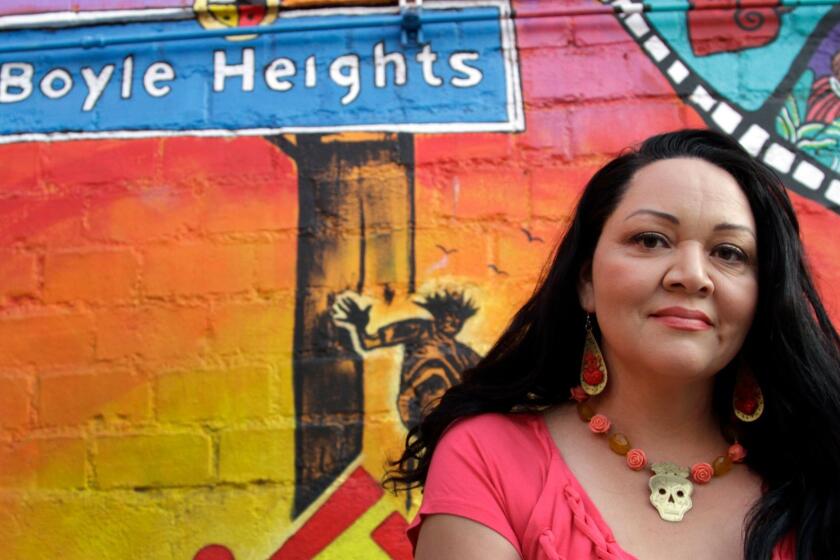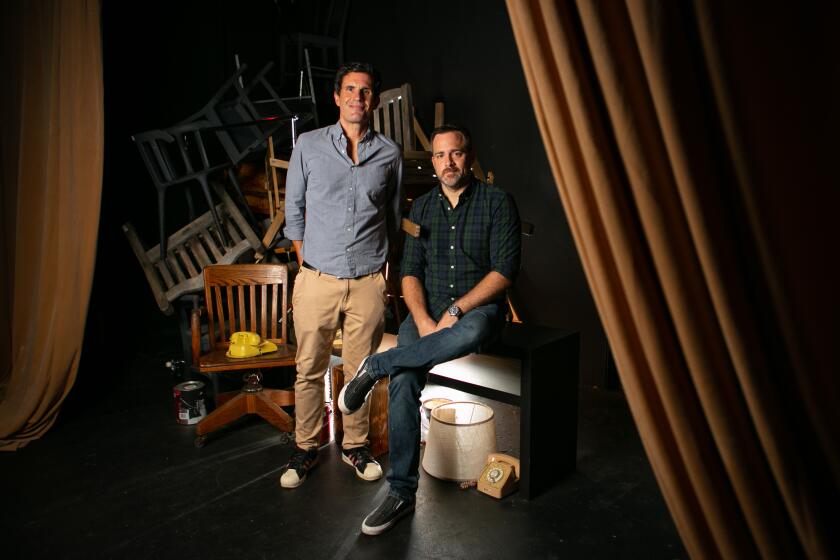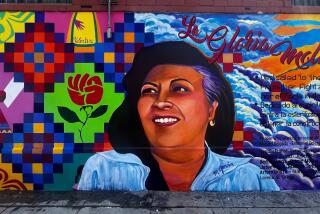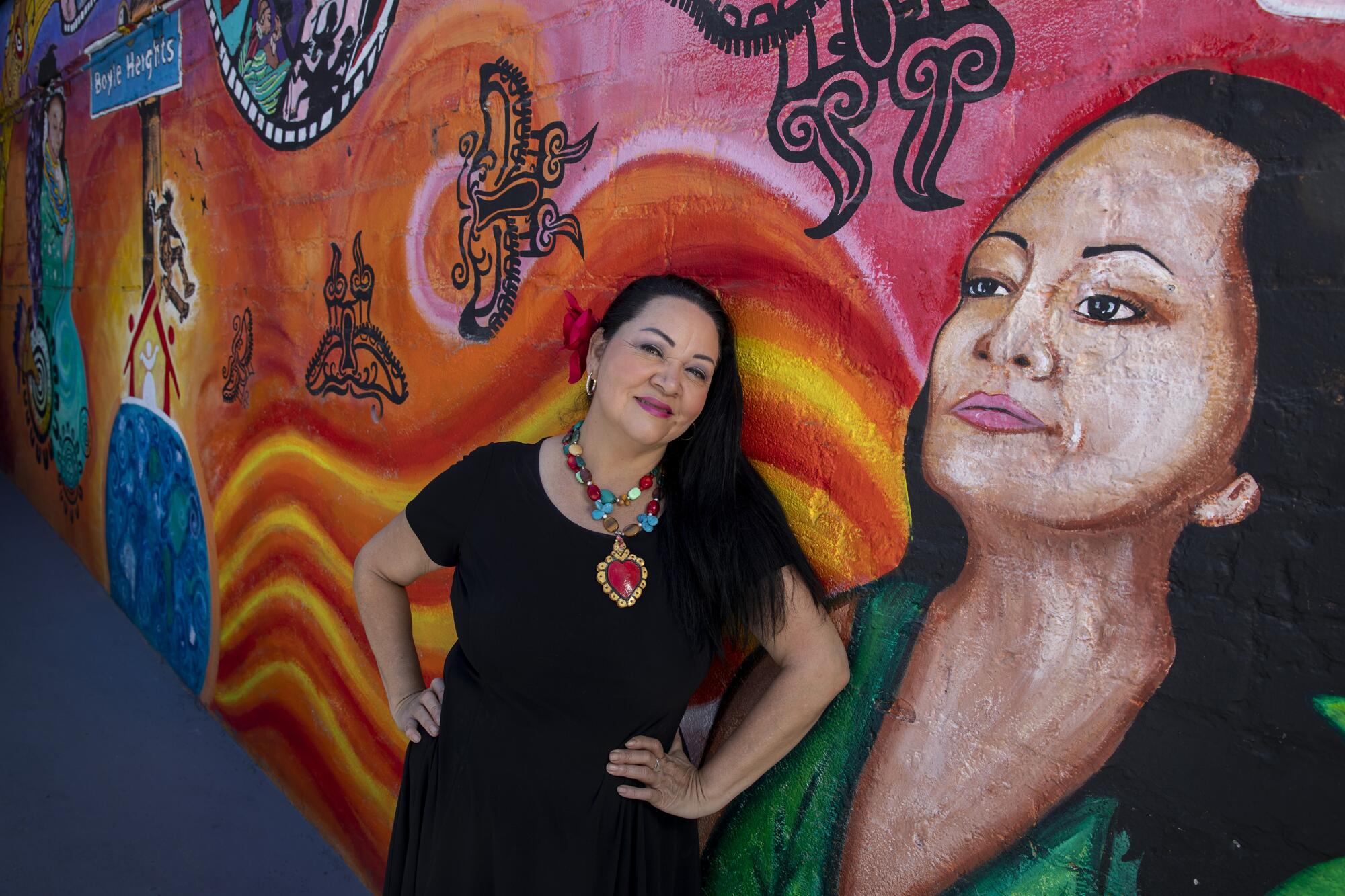
- Share via
On a recent Saturday morning in Boyle Heights, some two dozen youths line up just off the corner of St. Louis and 1st streets, outside Casa 0101, the 99-seat theater founded by “Real Women Have Curves” playwright Josefina López.
With face masks on and lunch bags in tow, the youngsters, ages 7 to 18, giddily wait for the building’s doors to swing open. Then, for the next 3½ hours, they hone their acting and dancing abilities in preparation for an on-camera production — a sci-fi comedy set in the year 3050.
Developed by professional screenwriters, the production takes its inspiration from scripts written by the young actors. As a result, it weaves in serious subject matter, including parents being torn from their children. “I want you to think of two or three things that have been taken from you and how that made you feel,” instructor Laurie Muñoz tells them during rehearsal. “Let’s express that with our movements, with our bodies, not our words.”
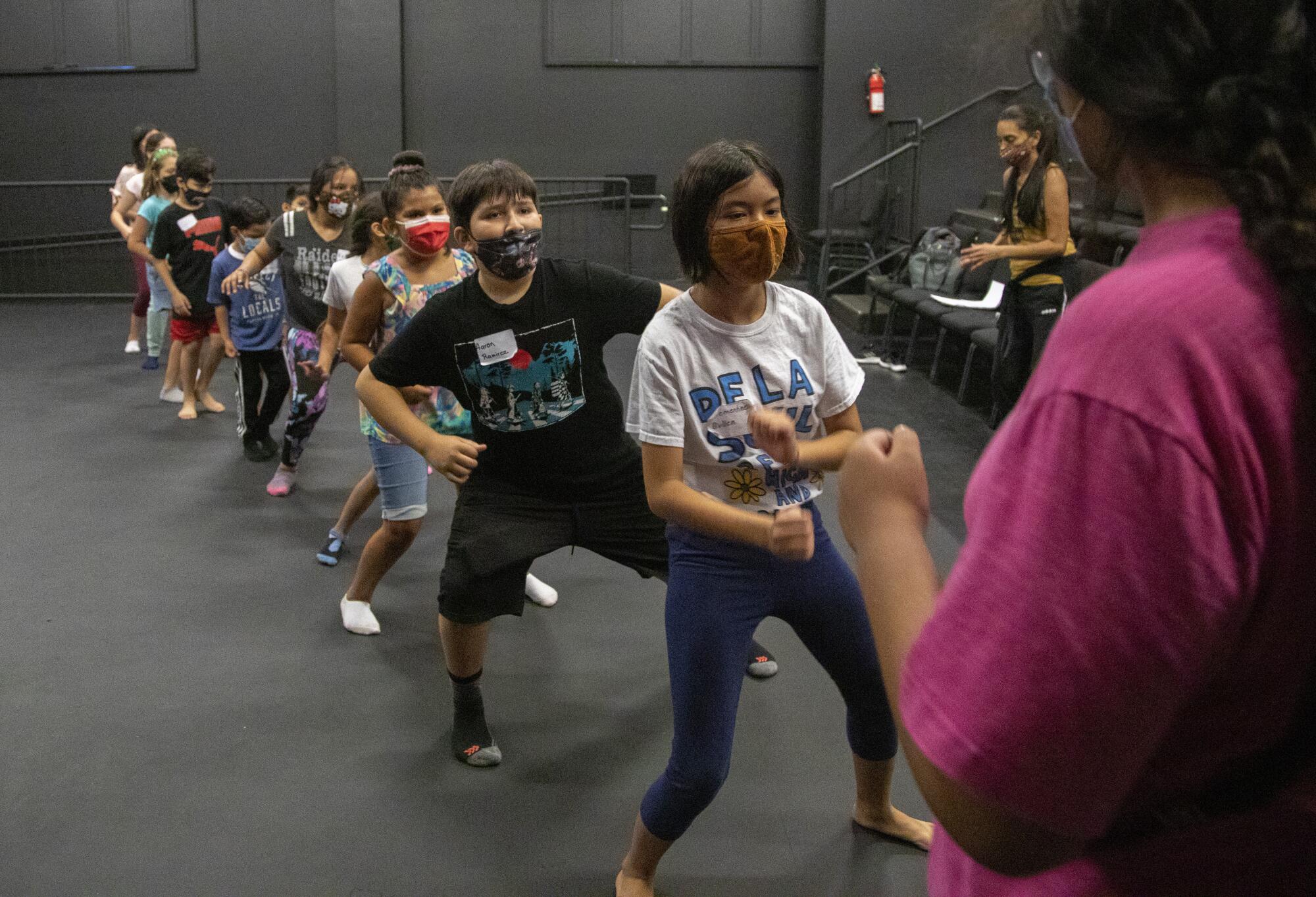
Boyle Heights
The young actors have come together every Saturday for four weeks, and they brought their parents with them. Some of these families live a few blocks from the theater. Others hail from Duarte, Huntington Beach, Riverside — even Bakersfield, more than 100 miles away.
López, who was an undocumented teenager growing up in Boyle Heights when she wrote her first play, “Simply Maria, or the American Dream,” founded the theater in 2000. “I created the space I longed for as a child,” she says. “This is where we win. This is where we’re the heroes and heroines of our story.”
Xavi Moreno remembers the exact moment he encountered Casa 0101 Theater.
For López, these heroines include women like Mercedes Floresislas, who was once an unhoused single parent and is now a social worker and playwright specializing in trilingual productions. Her work incorporates English, Spanish and American Sign Language, an effort to create opportunities for Deaf Latino actors. The heroines also include Patricia Zamorano, who spent the bulk of her youth in juvenile detention and is now a carpenter, heavy-equipment operator and playwright who centers the experiences of Chicana lesbians.
Lorena Marisol Ortega, a resident of Huntington Beach, is also among them. She leads a storytelling program for parents and caretakers at Casa 0101 so that they don’t just sit around and play with their phones while their children are in rehearsal.
With folding chairs and tables, they transform the theater’s main hallway into a writer’s room, responding to different prompts.
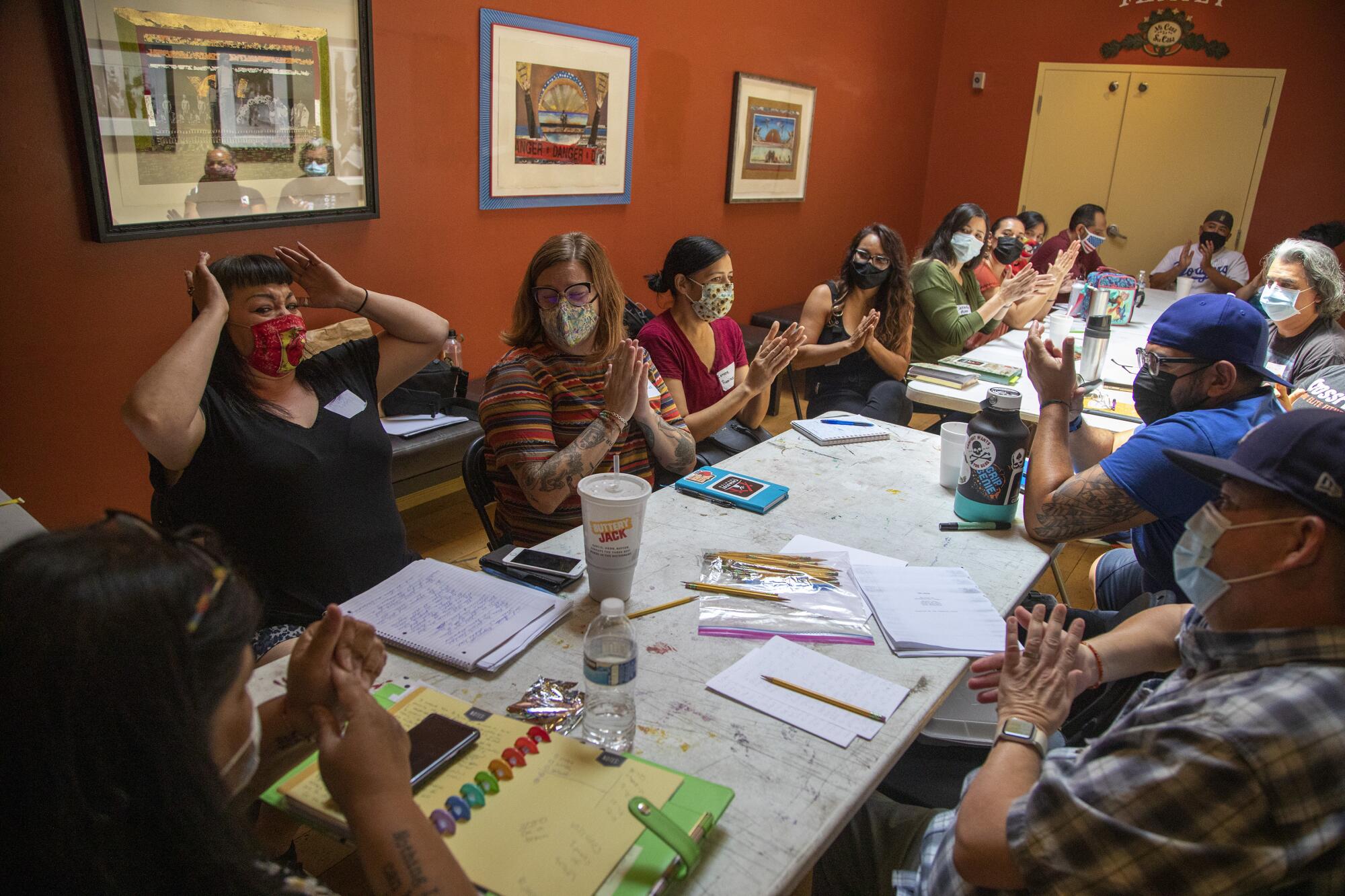
They share their stories aloud when they’re feeling brave. Often, their laughter reverberates against the walls.
Yet in March 2020 Casa 0101 went quiet when it became one of approximately 330 small Los Angeles theaters (as tallied by the Theatrical Producers League of Los Angeles) forced by the coronavirus to close up shop. As the pandemic dragged on, Casa 0101 and other small theaters began scrambling for ways to survive. Some, like the Fountain Theatre in Hollywood and the Slauson Rec Theater Company in South L.A., transformed parking lots into outdoor stages. Many local theaters began streaming performances. Casa 0101 took its robust arts education programming online too.
Edward Padilla, Casa 0101’s lead youth educator and producer, was initially disheartened by the move. Then he realized they’d begun to connect with young people who are normally out of reach. Once COVID-19 vaccines became widely available, Casa 0101 resumed in-person classes and rehearsals, and many of the youths who joined the theater via Zoom then persuaded their parents to make the trek to Boyle Heights.
“It’s great to be together again, sharing the same space,” Padilla says, “but the situation is tremulous.” He keeps tabs on local transmission rates and sends email updates to participating families. “We’re still taking it day by day,” he says. If necessary, Casa 0101 is prepared to go back online.
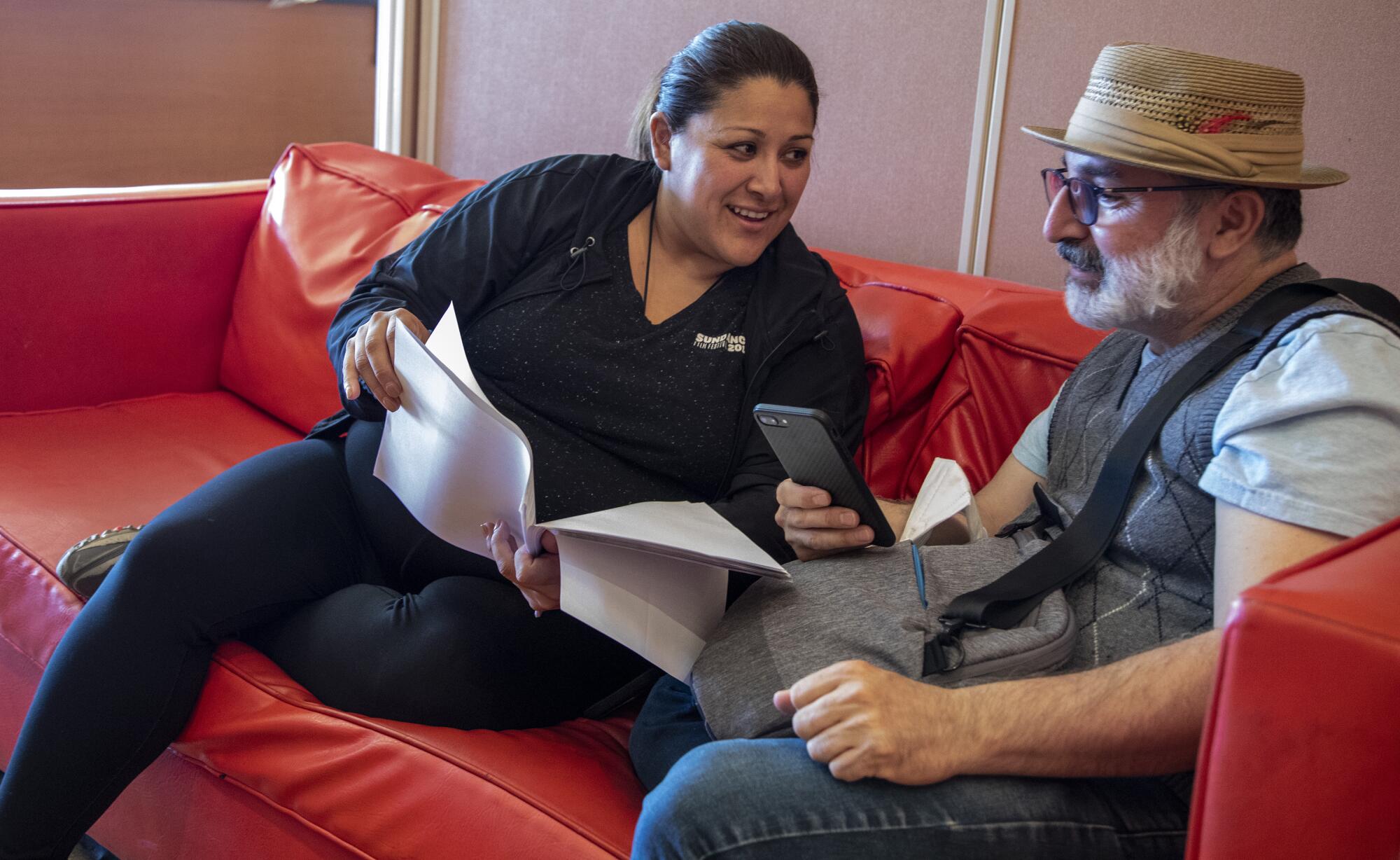
On top of the pandemic, California’s small theaters are grappling with another challenge: how to comply with labor regulations without going under.
Months before the coronavirus took hold of the world, state lawmakers passed a bill meant to protect workers from exploitation. Companies had taken to switching workers’ status from employee to independent contractor to maximize profits. In response, Assemblywoman Lorena González (D-San Diego) introduced Assembly Bill 5, which ultimately set new standards for hiring independent contractors and required many workers to be reclassified as employees entitled to a minimum wage.
The bill’s requirements have put extra stress on small, nonprofit theaters, where performers and those behind the scenes typically volunteer their time in exchange for experience, exposure and, on occasion, a small stipend. Emmanuel Deleage, executive director at Casa 0101, says the new law could generate permanent closures, no matter how well-intentioned.
“There’s been a good amount of relief money out there, and we’ve been able to access that. So we’ll get through the pandemic,” he says. “AB 5 is another story.”
Emergency pandemic grants kept them alive, but now what? With the fall season in flux, theater companies face the prospect of moving or shutting down.
Even before the global health crisis, adds Padilla, ticket sales rarely covered the cost of productions at Casa 0101, which relies on grants and philanthropic funding to make ends meet.
“We keep ticket prices low deliberately,” he tells The Times, “so that the community can actually come and enjoy the performances.” But striking a balance between overhead costs and what local residents can afford can be tricky. “Even if we just charge $20, if you’ve got a family of 5, it adds up.”
To help small nonprofit theaters comply with the new labor regulations, State Sen. Susan Rubio (D-Baldwin Park) introduced Senate Bill 805 in February, calling on the state to establish a grant program for theaters whose revenues cap at $1.4 million. If enacted, the bill would also provide low-cost payroll services for small theaters.
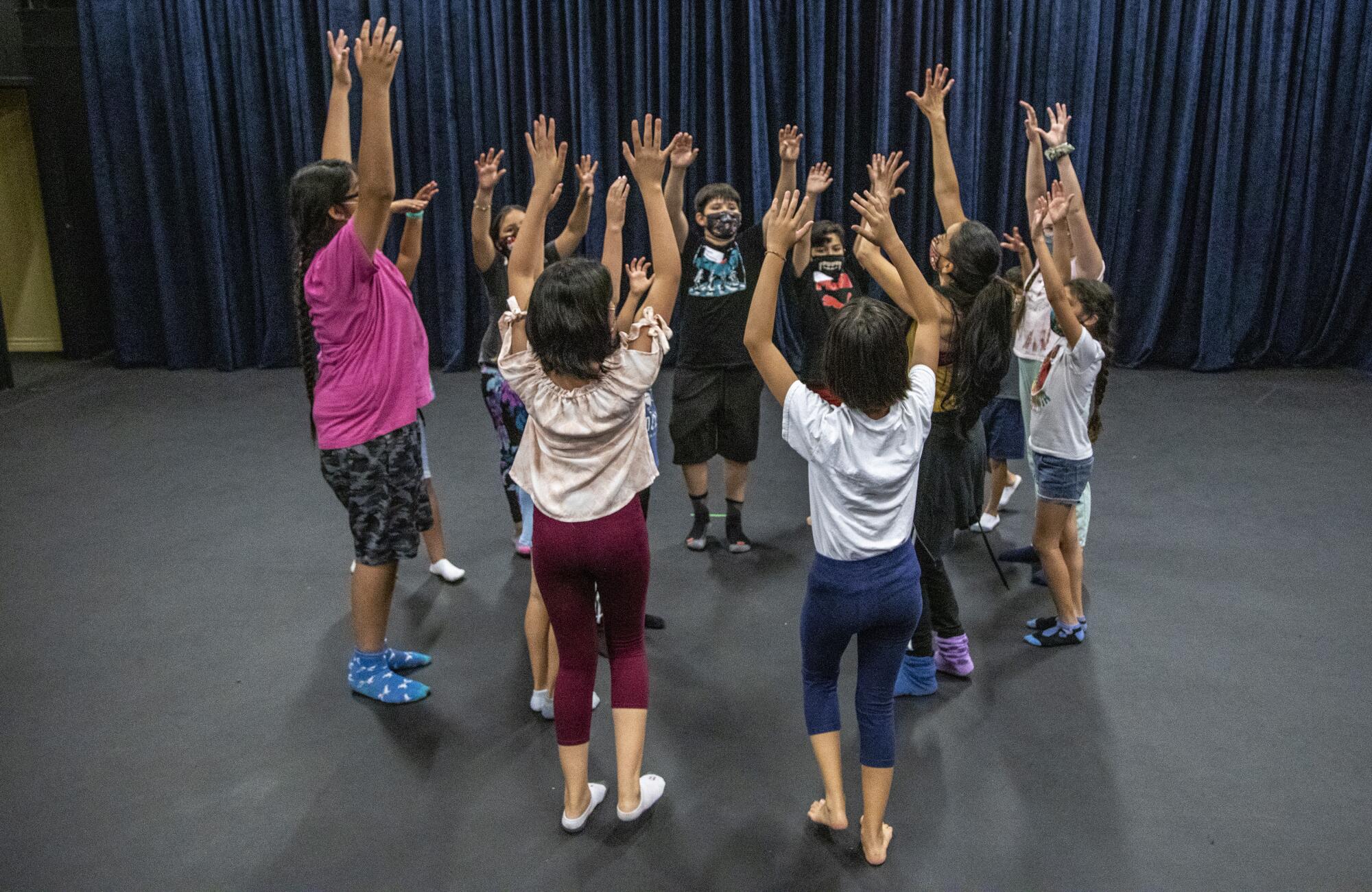
While advocating for the bill in Sacramento, Rubio reminded her colleagues that “major movements in our nation’s history have used performing arts to help elevate their cause and help shape policy.” To make her case, she pointed to El Teatro Campesino, which started as the cultural wing of the United Farm Workers union and used plays to raise awareness about the Delano grape strike.
In July, Rubio secured $50 million in immediate aid for small theaters in the 2021-22 state budget. But once those funds are used up, theaters will still need support to stay afloat in the long term. According to Martha Demson, board president of the Theatrical Producers League of Los Angeles, approximately 1,200 small theaters could qualify for SB 805 support in California.
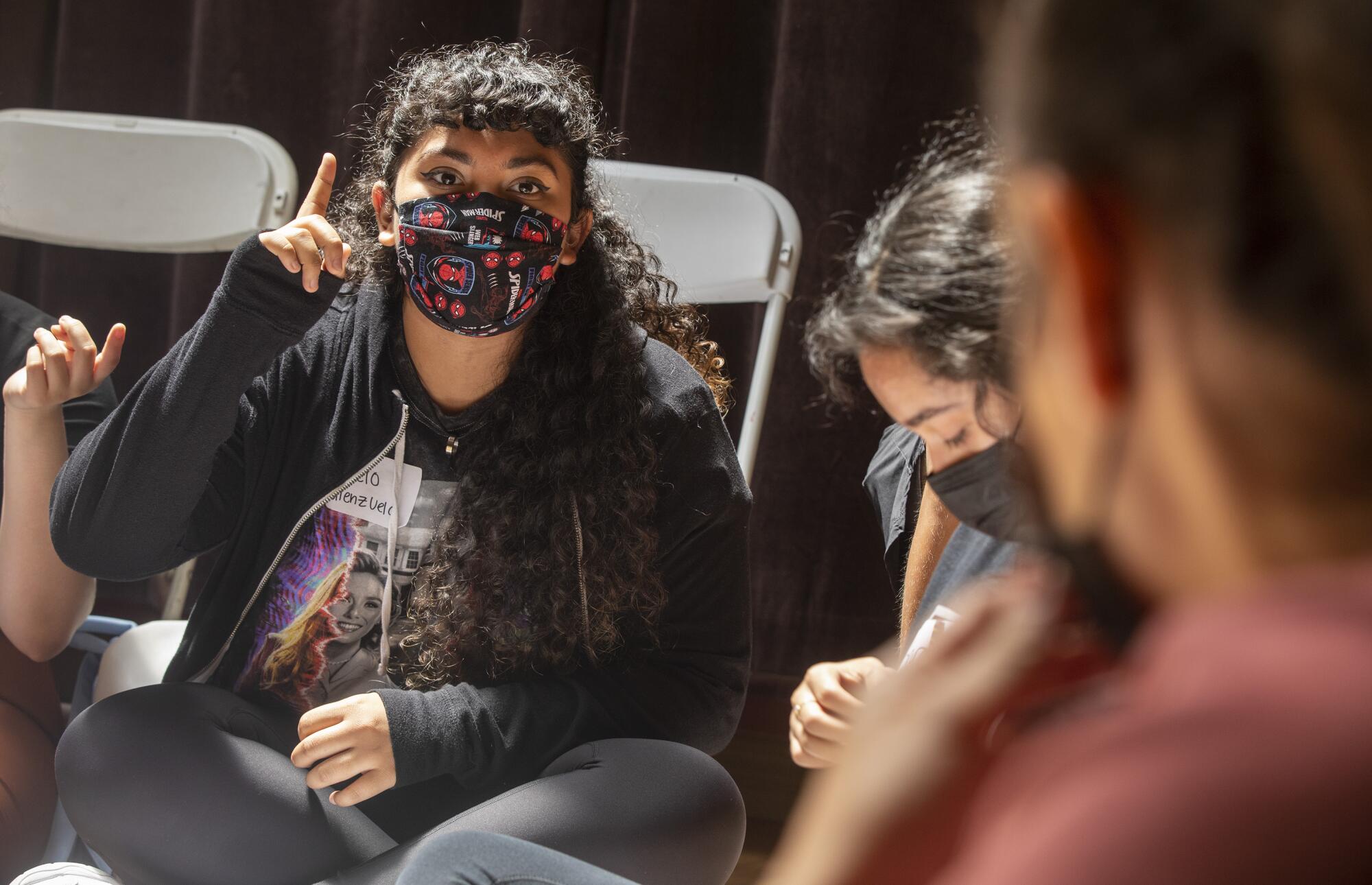
As Rubio’s bill continues to make its way through the legislature, dozens of small, nonprofit theaters have banded together in support of the bill. At their rallies, speakers refer to the theaters as incubators for tomorrow’s Hollywood stars. Often, they point to Kemp Powers as an example, whose play “One Night in Miami ...” made its debut at L.A.’s Rogue Machine Theatre before it became an award-winning film.
“In many ways,” Powers tells The Times, “your earliest supporters are your most important.”
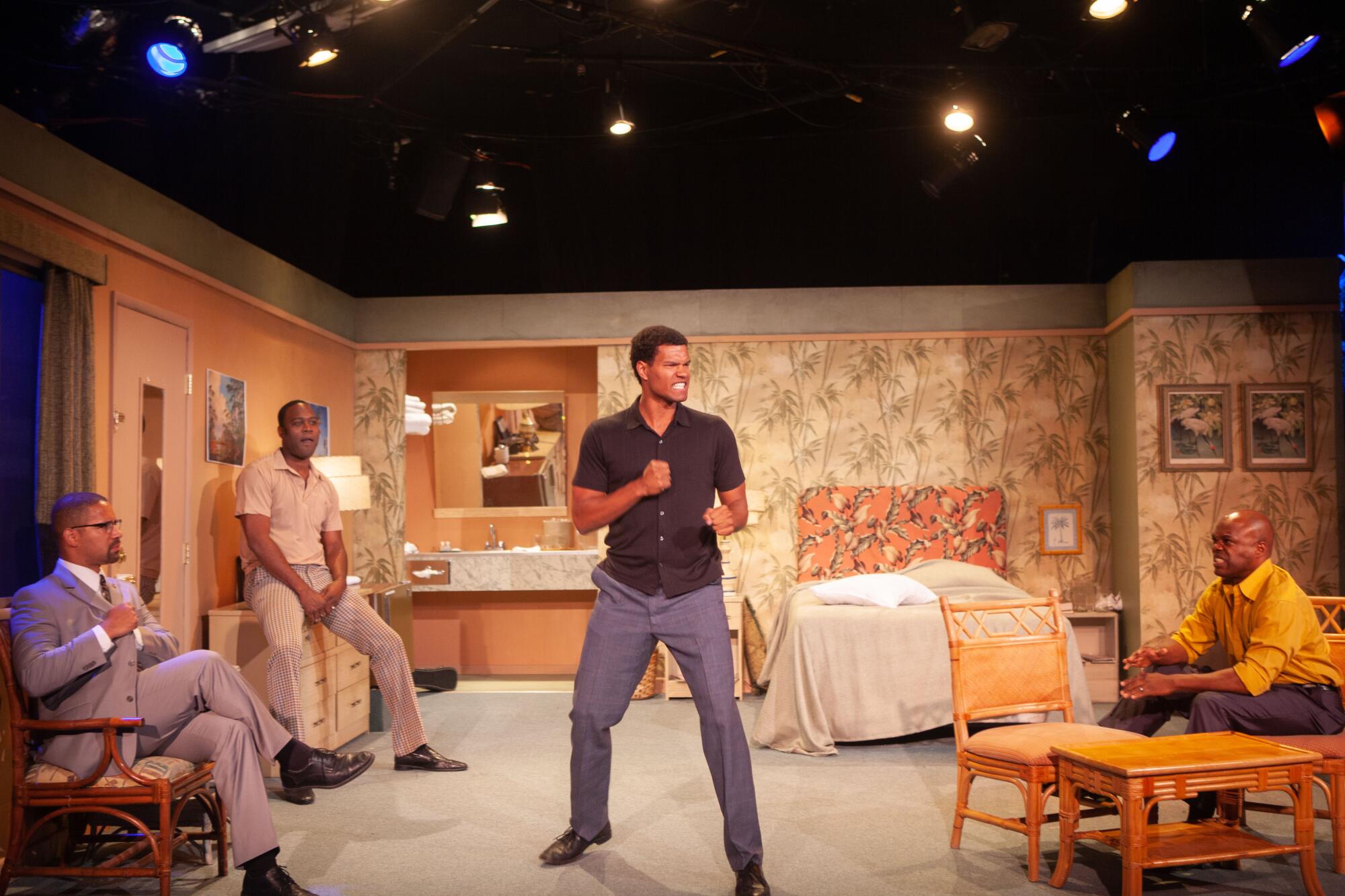
Small theaters have also been important to Xolo Maridueña, an actor best known for his role as Miguel Diaz in the Netflix series “Cobra Kai.” Maridueña grew up in El Sereno. As a boy, he and his sister took stage movement and dancing classes at Casa 0101. Once he had some acting experience under his belt, he was invited by Padilla to audition for “Light in the Darkness,” a production in which he played the younger version of the protagonist in flashbacks. Maridueña was 10 years old.
As his career progressed, Maridueña was offered a host of stereotypical roles for Latino actors — “gangbanger #2, drug guy.” He turned them down.
“It was so hard to keep saying no,” he tells The Times via email, “because I honestly didn’t know if other things would come.” He learned to stand by his convictions at Casa 0101.
López came up against similar roadblocks in Hollywood. After the success of her coming-of-age play “Real Women Have Curves” and the subsequent 2002 film that catapulted America Ferrera’s career and won two awards at the Sundance Film Festival, López thought it would be easier to make movies. So far, that hasn’t been the case.
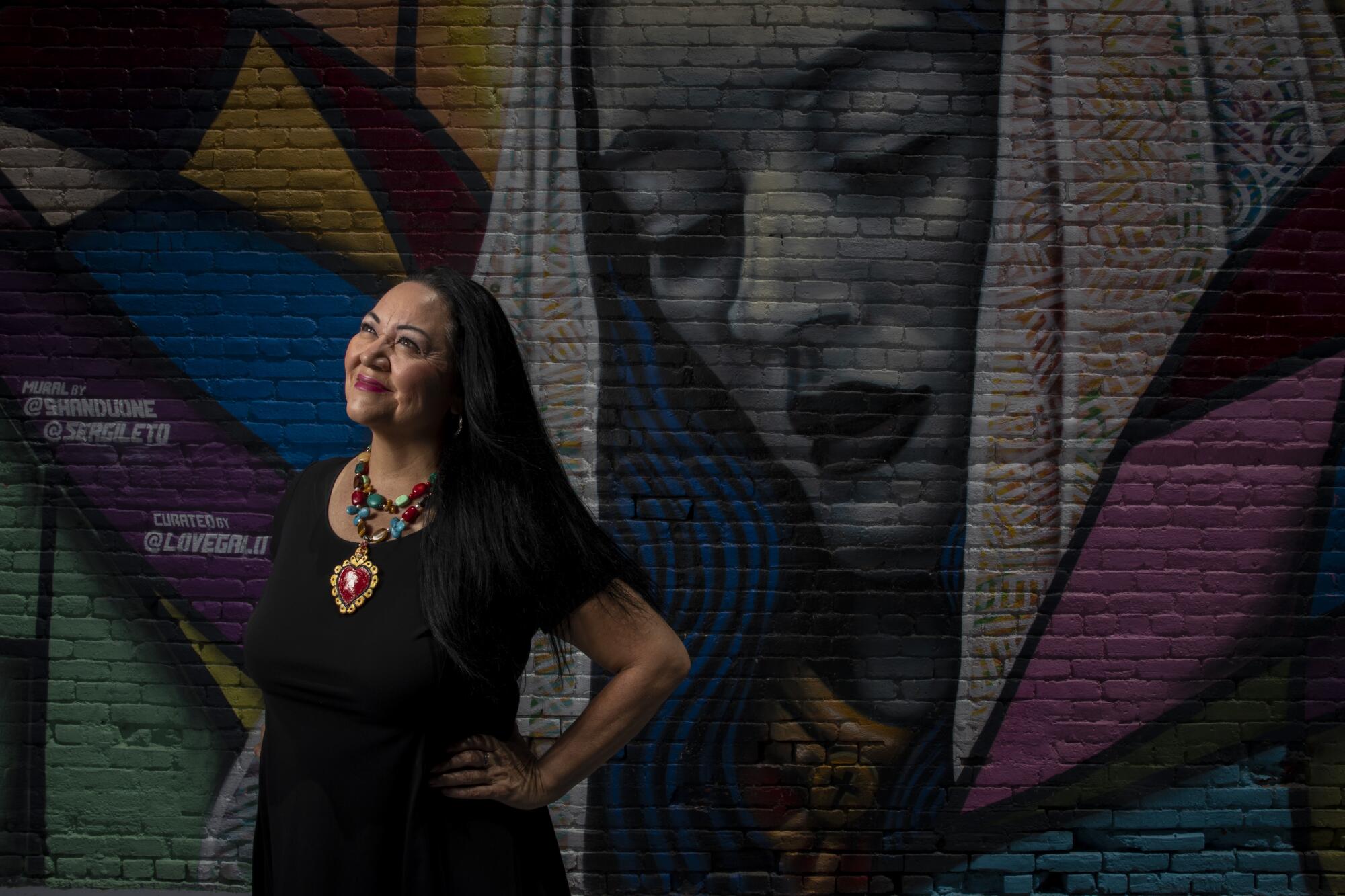
In her view, this is because of her work’s subject matter.
“In Hollywood,” López says, “they can’t just discriminate and tell you, ‘Oh, we don’t like it because it’s Latino.’ ‘We don’t like it because it’s about women.’ ‘We don’t like it because it’s about poor people.’ Or, ‘We don’t like it because it’s about immigrants.’ They can’t tell you that because you can go sue them. Instead, what they use is the term ‘commercial.’ They say: ‘We don’t think this is commercial,’ meaning the movie won’t make the money back, so we can’t invest in this.”
The rejections have not compelled her to switch course. “My work is about challenging the status quo of who is worthy of being a protagonist,” she says.
The representation of Latinos in Hollywood is one of her chief concerns. As a result, López veers from storylines that depict Latinos as perpetrators of crime and violence. As for Latinas, she rejects stories that portray them as servants or objects of desire.
“I am the kind of person who brings discomfort into a room,” says Lopez, whose other plays include “Confessions of Women From East L.A.” and the immigration tale “Detained in the Desert,” the latter of which she turned into a film.
Groundbreaking Sundance hit “CODA” created a space for Deaf actors on-set and made the environment accessible for all.
In writers’ rooms, where men tend to dominate, López is known to ask: “Aside from being beautiful, aside from being the complement to this guy’s fantasy — is this character interesting? Is she really her own person?”
Now, after years of making her own opportunities in Hollywood, she’s getting some long overdue recognition for “Real Women Have Curves,” which will be given equal billing with “Citizen Kane” alongside Bruce Lee, Mexican cinematographer Emmanuel “Chivo” Lubezki, film editor Thelma Schoonmaker and trailblazing Black filmmaker Oscar Micheaux in a special exhibit at the Academy Museum of Motion Pictures, which opens Sept. 30.
For López, 52, the distinction is significant. She’s especially giddy about her work being honored in the same museum that is celebrating Spike Lee, whose 1989 comedy drama “Do the Right Thing” inspired her to become a filmmaker.
Still, López says, “It’s bittersweet. I don’t have much of a screenwriting career. I have some projects here and there. And yet, I’m here at the academy, which tells me: ‘Your work is worthy, it’s made history, it’s changing things, it’s speaking truth to power.’ But it’s only one.”
More than anything, López is tired of hearing that “Real Women Have Curves” is unique. “Why can’t we have more movies about race, class and gender?” she asked. “Why can’t this be the norm?”
Meanwhile, work she’s started at Casa 0101 goes on to make sure “the norm” includes stories from a new generation of Boyle Heights voices.
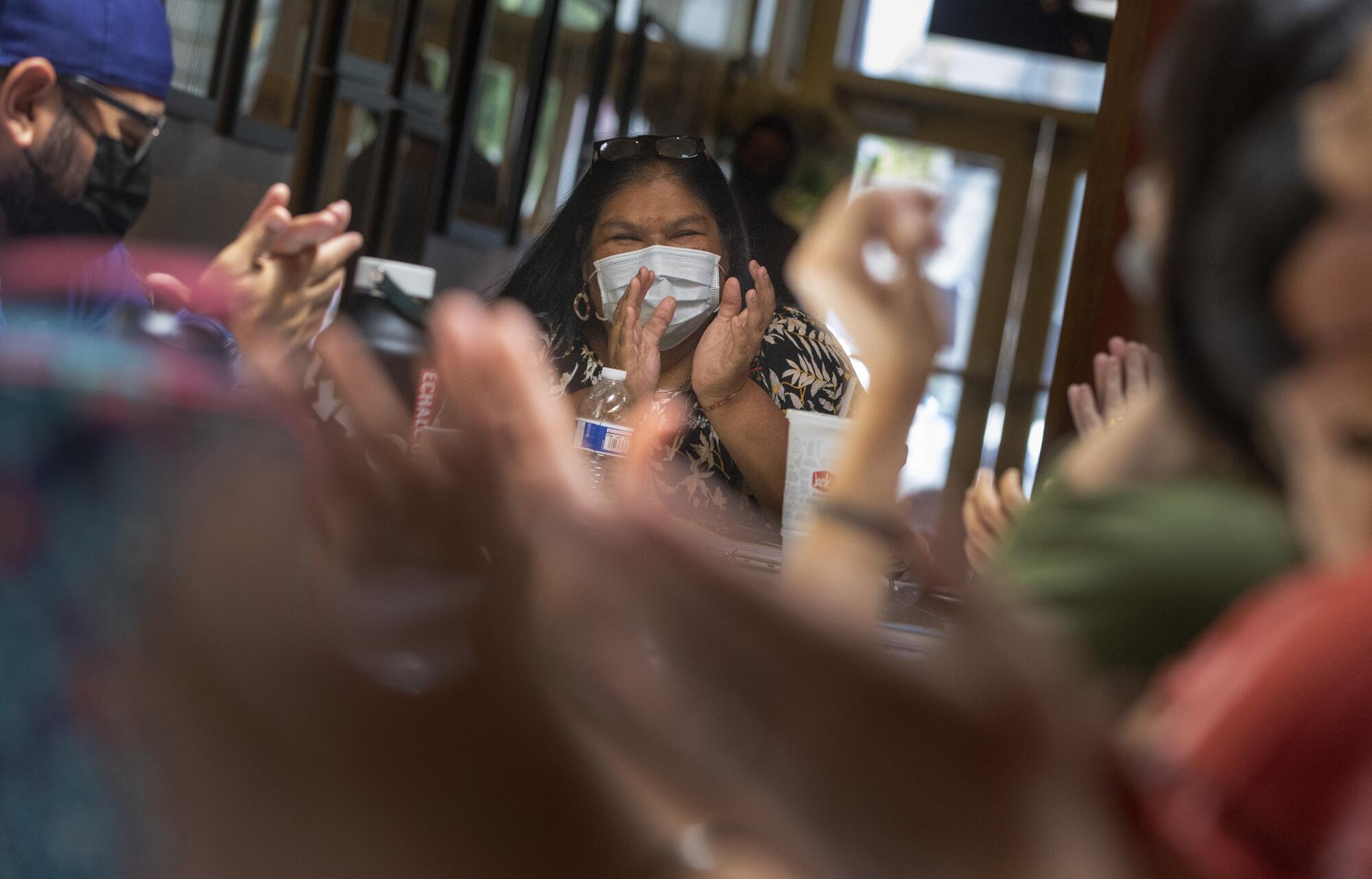
More to Read
The biggest entertainment stories
Get our big stories about Hollywood, film, television, music, arts, culture and more right in your inbox as soon as they publish.
You may occasionally receive promotional content from the Los Angeles Times.
